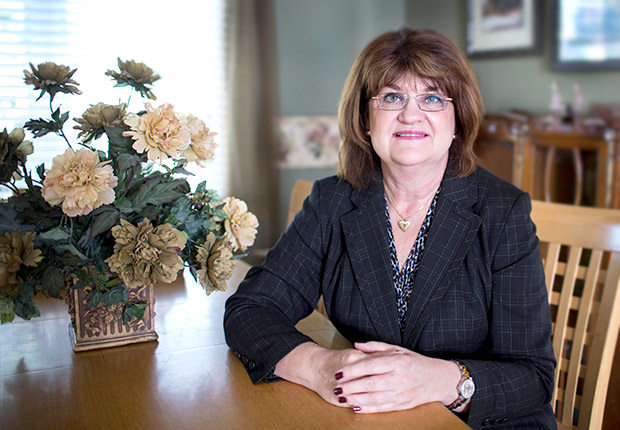AARP Eye Center

By Mary Van Beusekom
Dianne Pettet’s husband, Dale, was being released from the hospital after a stay in the intensive care and rehabilitation units.
Suffering from emphysema and heart disease, he needed to continue to receive supplemental oxygen at home.
“They handed [the tubing and oxygen tank] to me at the nurses counter, and I’m just about in tears,” recalled Pettet, 64, of Lakeville. “I had no idea what to do with it. I thought, ‘If I put this on his face and it falls off, will he die?’ ”
Pettet, a senior training consultant at a financial services company, was constantly stressed from knowing that her husband’s life was in her hands.
“I had no nursing background. I didn’t know how to tell if his oxygen was getting low,” she said. “I was only 56 then, and I thought, ‘What would I do if I were an 80-year-old woman taking her husband home?’ ”
To help prevent scenarios like Pettet’s, AARP is encouraging Minnesota lawmakers to enact the Caregiver Advise, Record, Enable (CARE) Act during the legislative session that begins Jan. 6. The act would allow a patient to designate a caregiver and require hospitals to contact that person when the patient is about to be discharged. The hospital also would have to provide instruction on medical tasks to help care for the patient at home.
The CARE Act would formalize the role of family caregiving—unpaid and unrecognized work which often involves complex tasks such as administering injections, managing medication and doing wound care, said Mary Jo George, AARP Minnesota associatestate director for advocacy.
“This [bill] is an official step to make caregivers part of the health team process,” George said.
The nearly 1 million Minnesotans acting as caregivers are allowing older family members to live at home longer, saving the state about $8.2 billion each year, according to a 2011 report by the AARP Public Policy Institute (PPI).
Nationwide, only 31 percent of family caregivers said they had a home nurse visit after a hospital discharge, leaving the others to navigate a complex, fragmented health care system on their own.
High readmission rates
Hospital readmissions (returning to the hospital within 30 days of release) are often a sign of lack of follow-up care. Minnesota ranked first overall in long-term services and supports in a report released in June by PPI and others.
But the Minnesota Hospital Association noted that “nearly one in five Medicare patients discharged from Minnesota hospitals is readmitted within 30 days.”
Now that provisions in the Affordable Care Act are penalizing hospitals for readmissions, hospitals have a financial incentive to prevent them. This has primed the environment for a law that would require hospitals to ensure that caregivers understand what they’re supposed to do and why it is important to do it, George said.
Without such training, there is too much room for error. “We can see adverse consequences that can be costly and even life-threatening,” she said.
The Minnesota Hospital Association has not taken a position on the bill, but spokeswoman Sarah Ford said hospitals are already working on reducing readmissions and improving transitions to home and other care settings by more closely involving patients and their families.
Pettet, who cared for her husband for six years before he died two years ago, said having advance training before he was released would have made all the difference in his care.
“When you check out, they give you all these papers that you don’t understand, and it’s so overwhelming,” she said. “And when it’s your loved one, you panic.”
Vikki Casey Steward, 59, a retired pharmaceutical account manager and AARP caregiver legislative advocate, said the state has to do a better job of supporting caregivers. She and her family cared for her father, who had vascular dementia, for five years.
“Sometimes the resources are there if you reach out and find them, but we have to do a better job of getting materials and care plans in front of caregivers,” said Steward, of Eden Prairie. “And that, honestly, is a huge challenge.”
AARP Minnesota and groups such as the Metropolitan Caregiver Services Collaborative, the Wilder Foundation and the Metropolitan Area Agency on Aging are working to underscore the importance of this policy issue. AARP Minnesota is organizing a coalition of caregivers and caregiving advocates to bring their voices to the state Capitol, George said.
AARP has already trained speakers to talk about the CARE Act, brought caregivers to the state Capitol to speak about their experiences and put together a caregiver network advocacy team, George said.
Steward encourages AARP members to participate in lobby days, write letters to legislators and newspaper editors and consider volunteering as a caregiver legislative advocate.
For information on becoming an AARP caregiver legislative advocate, contact advocacy and outreach director Erin Parrish at eparrish@aarp.org or call her at 866-554-5381 toll-free.
Mary Van Beusekom is a writer living in Excelsior, Minn.























































